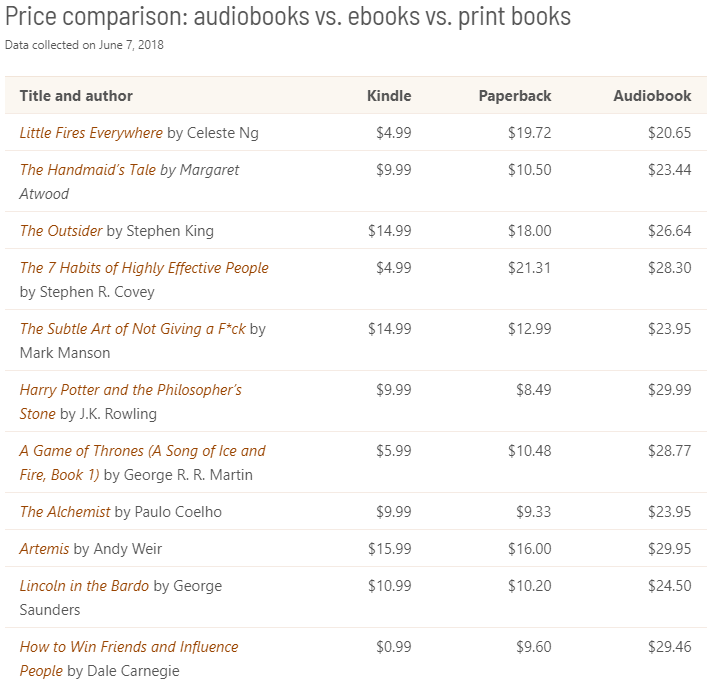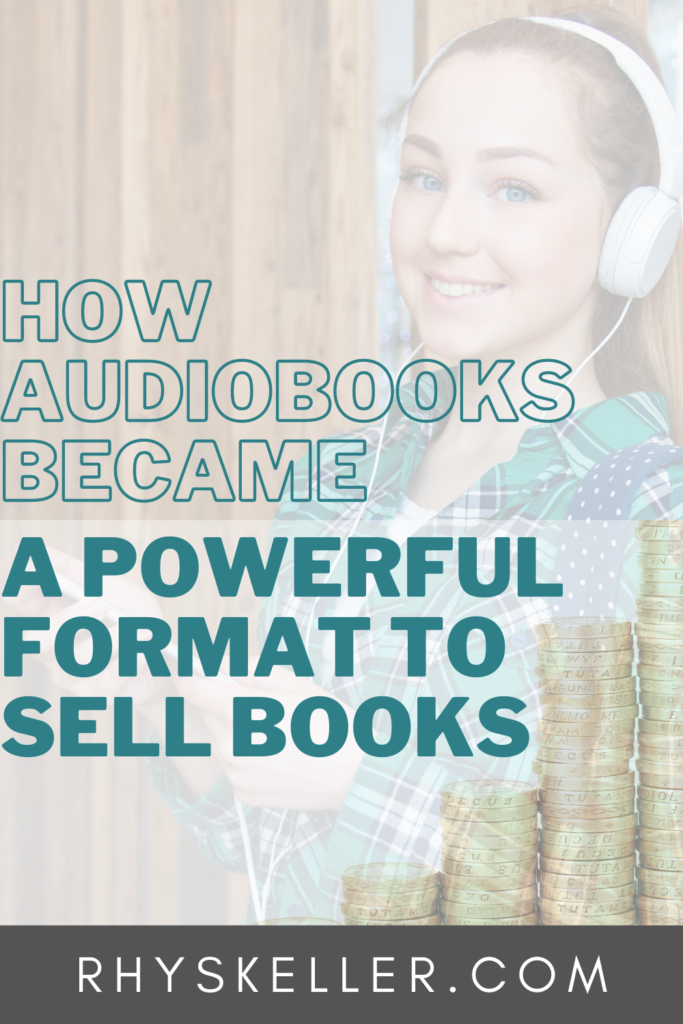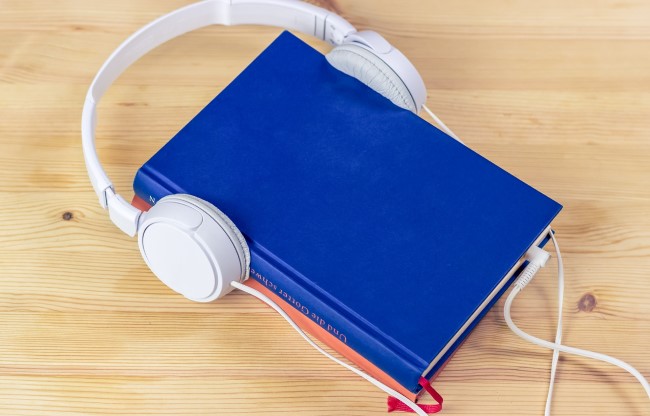It’s hard to imagine a world without audiobooks and only those 89 years old or above (not exactly my target audience) could personally remember such a time. The audiobook revolution was an unexpected, slowly adopted medium for book sellers that is now responsible for more than $1 Billion in U.S. revenue.
With audiobook sales growing 25% year after year, it’s no wonder more books are turning to audio format to engage new and old customers. I’m an avid audiobook fan for my daily commutes, walks around the neighborhood, and even workout sessions – though I admit workout intensity certainly suffers when you’re listening to books on goal setting. But if I was living before the 1930’s and especially before the 1970’s, I’d have a hard time finding an audio program for my liking.
Audiobook History
The audiobook format got it’s notable start in the 1930’s. Educational material, poetry, and plays were provided in what was referred to as a talking book. The primary purpose was to assist blind readers, a visionary idea by Thomas Edison that was first fulfilled in 1877 through his phonograph reading of Mary Had a Little Lamb. Serving people with a valuable solution reaped tremendous benefit for an entire industry and brought entertainment and education to the world in a new way. Remember that next time you come across a disability!
Due to space restrictions on the first spoken word devices, only 4 minutes of audio was possible. The 1930’s saw audio space improve to 20 minutes which enabled the growing market for educational application. But it wasn’t until the 1980’s that book sellers really began noticing the power of talking books and in 1994, the Audio Publishers Association coined the revolutionary new term, audiobook.
Audiobook Growth
You may think audiobook sales, having gotten their start as talking books for educational materials, would be primarily benefiting non-fiction. Forbes survey data proved otherwise and found “The most popular audiobook genres in the US in 2018 were General Fiction, Mysteries/Thrillers/Suspense, and Science Fiction/Fantasy, the survey found. Non-Fiction sales were close, representing 32.7% of unit sales in 2018.”
The famous personal development motivator Zig Ziglar often encouraged the use of audiobooks while driving. He would go on to explain that if people listened to educational programs while they drove, they could easily receive the equivalent of a college education. Compare that use of time to everything else the average person does!
Many readers aren’t aware of the plethora of audiobook applications available to them, especially people in older generations who are still coming to terms with smartphones. With more than 20 audiobook applications available it’s no wonder people are confused. My favorites have been Overdrive, Libby, Hoopla, and LibriVox because of their ability to connect to local library systems. LibriVox is unique in providing a large collection of free audiobooks (typically classics in the public domain or indie books aiming for increasing exposure) and a separate paid collection for newer titles.
Audiobook Pricing
While it’s true that audiobooks eliminate the need for physical material, they still incur cost. The expectation by most readers is that audiobooks should be cheap and cost only pennies on the dollar. While many authors and book packagers do sell audiobook formats much cheaper than physical copies, there are many audiobooks that are more expensive than their tangible counterparts. Ebookfriendly found these surprising differences between paperback, ebook, and audiobook formats for some popular titles.

Knowing the time it takes voiceover artists or authors in reading, editing, and creating an audiobook, and the value in having an audiobook to listen to during other activities when reading a physical book is impossible (or dangerous!), it makes sense that some audiobooks are priced accordingly. I remember how impressed I was hearing a professional voiceover actor read The Count of Monte Cristo via LibriVox. It transformed the reading experience for me and caused me to listen to a few more audiobooks by the same voiceover actor! Thank you, David Clarke!
The Audiobook Future
You know first hand how busy our world has become. With more to get done and less time to do it, our need for accessing information on the go will continue growing as the driving force of choice. Sure, it’s nice to promote and seek out uninterrupted time to sit quietly alone in a comfy chair with a mug of coffee nearby to inject ourselves into a written world of entertainment or education. But that scene is becoming a rare treat, not the norm.
Fortunately or unfortunately, the norm is listening on the go for kids and adults. Audiobooks, only technically being around since the 1990’s, are still in their infancy. I’m often amazed when I drive up to a stop light while listening to The 100 Absolutely Unbreakable Laws of Business Success by Brian Tracy and the car next to me is blasting rap music (or any music for that matter). Sure, music is nice, but who’s got the time for that, right?
If you’re an author, be sure you’re leveraging the power of the audiobook format to engage an ever growing majority of busy readers. If you’re a reader, try downloading a new audiobook app and find books you’ve never seen before (or listen to your favorites and experience them in a whole new way). If you’re that person spending your commute listening to music, give audiobooks a try. If you go the educational route, it’s basically a free degree. If you go entertainment, you’ll be all the more interesting for it!
Audiobooks were created to eliminate the barrier of accessibility between people and information. That accessibility will continue to grow, enabling those will less direct availability to books or the ability to read. Just imagine your next book first written in one language but available in every tongue for every tribe. That reality is coming ever closer as cheap technology spreads far and wide.
The market for voiceover actors and actresses is growing. If you love to read and are willing to learn some new languages, your ideal job may be waiting for you in the land of audiobooks. What better way to earn some coin than reading books and helping others enjoy the books you love? Take advantage of the market until artificial intelligence can read without sounding like The Terminator.
I’d love to know what you think about audiobooks and what some of your favorites are. Leave your comments below. I’d also like you to be first in receiving new content. If you’re not subscribed yet, please find the email subscription box on the right sidebar (or below if you’re on a mobile device). If you found this article interesting and informative, it would mean the world to me if you shared it with your friends using the social media buttons provided.





Wilburson
October 5, 2019Such an interesting post Rhys especially delving back into the early history of audiobooks. I had not realised quite how long they have been around. In our multi-tasking time-deprived society I’m sure that the up take of audiobooks is certain to increase and they will finally become the norm. You make a good point about the disability angle too. I know many younger people already embracing learning through audio applications and it is a wise time investment. Then there’s always the entertainment audiobooks which could be shared by a whole family on a car journey. Exciting times ahead in the audiobook market.
Rhys Keller
October 5, 2019Thank you, I couldn’t agree more! Who knows what other gold nuggets lay behind the technology we see as commonplace in our modern world. Audiobooks will certainly grow in influence and quality as more people become connected.
Mylinda Elliott
October 5, 2019I have never quite figured out audio books very easy. The few I have listened to have been great though. Thank you for the back story
Rhys Keller
October 5, 2019Thanks, Mylinda. You’ll get the hang of audiobooks soon enough!